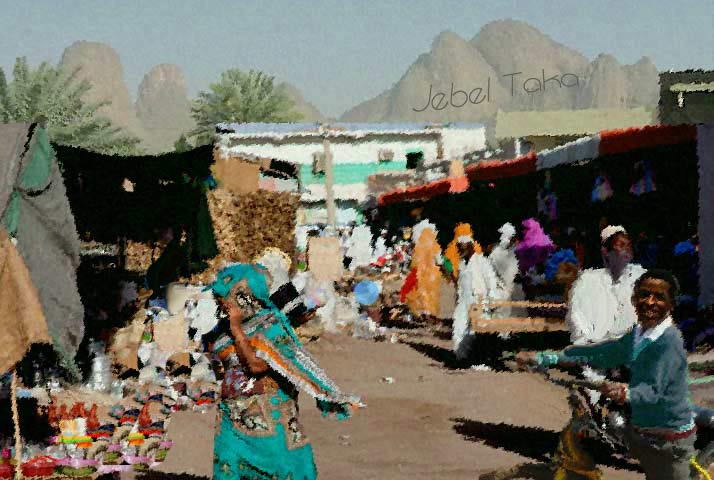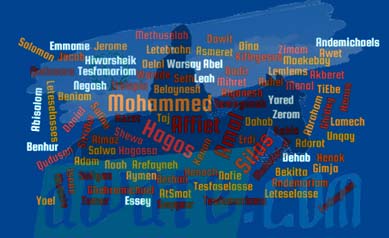A Boy’s Odyssey into the Multicultural Nature of Eritrea

It sounds Like Tigrinya, but it is not Tigrinya.
When I was thirteen years old, a kid I met during our trek to the Sudan once said this to mock me: “haa wo tekkal shweshsh[1]” as he skillfully navigated the bushes, donning his shorts, which were as tight and as short as todays boxers. I did not make anything of it then, but slowly during our hide-out to our destination, and then in the Sudan, I discovered that there is a unique language that sounded like Tigrinya, but it is not Tigrinya. Just to whet your appetite, take a look at the following statements and see if you can make any sense of it. For a few it will be no brainer but for many it will be daunting and most of the parts will not sound like Tigrinya.
I am not talking about the rare variety of words such as calling “effun” “elbbo” in some areas of Akele-Guzay region or “netti ferres teyqqo vs. sheblillo: (harness the horse)
I am not talking about the different flavors and accents, I am not talking about the Asmarino Tigrinya that is heavily sprinkled with Arabic and Italian. I am not even talking about the unique Kerenite Tigrinya. The Tigrinya I am talking about sounds like Tigrinya, is spoken by a Tigrinya ethnic but it is not Tigrinya in the true sense.
ezza gualley netti shishig [2[ emo attimnni
ezi habrom woddey enttay dea tim elkka awrrerrika [3] dikka
Atta weddi entay konkka shommal-shommal [4] tkheyid
Tebbay gibberi bezzi messentso [5] gerre krtim-krtim keyyeblekki
Enda hattinokhi Rigbe betsihe gaae [6] kibl eye eza gualley, nebokhi drar qerribllu
And then there is the way they pluralize their nouns. Every region would say qollut, merrut, qusshet, wereqaqtti, but in the Tigirniya I am talking about, they would say, qollaawtti, merrawtti, werreqqetawtti and qushotawtti etc.
I am talking about the Tigrinya spoken by the indomitable people of Anseba.
And when in high school during history lessons I learned about a field of study called Anthropology, I fantasied of becoming one and be an authority on the Anseba people, I had it all planned in mind: I would marry their daughter who has grown up on milk (tseba tseggeb) and I would study this people and vivisect their story, their accent, their culture, language, that is an amalgam of Tigre and Tigrinya and strange diction. I would write about how they curse you profusely when you anger them and express their admiration and joke with you when you please them, I thought about how it takes a skill to decipher whether they are joking or really cursing you, how they endear you when they are found of you. To be truly immersed in their inner circle, I also would own “kltte bettri”, a herd of hundred cows.
This was way before I found a new and competing interest in Tigrayit and Arabic but like the dreamers of the night, like dreams of Ghedli, like the prisoners of Ella-Ero, just like the yearning of Eritreans those adolescent incursions have vanished into the thin air, those are now faint traces in an adult memory. Some times I wonder if they are just figments in the recesses of my mind.
“Seduction” was the Attraction
It was a very hot May afternoon and I was sipping a steaming cup of tea and waiting for my best friend, Salah. The dust that originated from a whirl-wind that started a few feet from the Neem tree I was sitting under, conspired with the hot air and molested my nostrils, but suddenly I forget my discomfort when my attention was stolen by the Sermon of a Sheik from nearby Mosque: “…. Ezza kaana qemissehu mumezzeqen min al-amam … Hiyya kannet alleti trawudehu”: (If his clothes are torn from the front, it was he who was seducing her, but if his clothes are torn from behind, then it was she who was seducing him”.
I loved the voice of the Sheik, the sound of the words, but I did not understand the verse, even if this was my second time I am hearing it. I only latched into the word” yrawedaha”, I repeated it again and again so I would not forget it until I consult my “dictionary”, my best friend Salah. The soothing sermon was over, the heat and humidity was unboreable, so I decided to ride my bike and go to my friend’s house before the appointment. But the lock on my bike was stuck and I cursed my bike, the heat and the dust and the useless shade of the tree, the day I came to this country: “neal diinek!!”. Before I knew it two kids punched me from two directions as I defended my self in the scuffle, my nose bled, I cursed again and they punched again. Magically the lock gave in and I rode my bike. Salah was ready and we rod his bike towards a fancier tea-shop, as he pedaled he panted like a Sudanese dog lying under a tree cooling itself, and he whispered into my ears:
“Let us go to Hannan’s shop and eat tehniyya with dates instead”, he said
“Are you crazy, her brother, abbu digin (the bearded one) will kill us”, I replied
“He is in Port Sudan and her father likes us, he knows we like school and we are good influence, he told that to my mother last time.”
“No, let us go to the middle school exhibition”
You want to see Afaff, admit it?”
“No, I am fascinated by photosynthesis”
So we did a draw and I won and we rode to the exhibition”
Afaff was explaining “temsil addewiee”, how plants perform photosynthesis. She was impressive.
So I decided to practice my Arabic so one day I can be as impressive as my friend and the Sheik behind the sermon and I wrote: “enna Allah khelleqqa jemaalen lekeyy yeajeb bihu al enssan, wo ha anaa muejjeben”: God has created beauty so a man would be enchanted, and so I am. After flashing a sparking smile, she jotted something, but before the reply arrived, it was snatched by a young teacher, dapper with perfectly pressed cream shirt. his shirt was not tucked. I examined him as my eyes darted from his head to his feet, he wore “sfinjja”, those infamous plastic slippers.
He pulled me outside, Salah lurking behind and laughing, the teacher read my message aloud, he critiqued it mercilessly, he said “not jemallen, the correct one is jemaalun, not muejjebun, muejjeben”. He explained it in an excruciating detail and how I mutilated the language.
“Young man, next time, if you are not sure of your tenween use the skuun, sekkin teslem!!”.
My heart stopped racing, when it was apparent that I will not be stoned, but I got a lesson in Arabic special gramma called “tenween” where the sound of the noun depends on whether it is subject or object
Before he left he shook my hand and introduced himself as Ustaz Bushra,
Then he asked, “and you good name is?”
Semeer-Al-din”, I replied with a tongue in cheek to the shock of my friend
“Sherrefta, mashaallah Muslim kemaan!”
“Aywaa, thanks God”, I said as I put my right palm on my chest.
But then he turned and said, “by the way do you pray?”
I stuttered, thinking I am not out of the woods from the stoning yet, but he interrupted me and said, “by the way a bike does not have religion, and if you curse the religion of the bike in this country you will be punched. I saw your fight with the boys earlier and I did not intervene so they could teach you a lesson. Work on your “tenween”
“Salah, what does yraawidaha mean” I have once asked him, the first time I heard the word from the same Sheik, in the same place and at the same time
He recited the Quran and it sounded like what the Sheik was saying
And he went into great pains to explain it to me, but he failed to succinctly tell me the meaning either in Tigrinya or English. Luckily, he had a young uncle who was educated in Egypt and he asked him and the uncle without skipping a beat said, “SEDUCTION”, elaborating on the wrongful accusation of Joseph by the Pharaoh’s wife and how an infant miraculously talked to save Joseph.
Salah has said, is ancient Egypt and Arabic and Quran the next fascination/obsession now?”
But those silly fascination and obsession with Arabic and Ansebite would come in handy in informing your truly about the makeup of the country beyond the silos of one’s origins and the cloistered close knit relatives, and would inform the political point of view and hopefully the affiliation to a political party if Eritrea enters its long promised gilded age.
The adult dreams are even sillier than the adolescent fascinations. I would run for an office and during my stump speeches, I would imagine myself effortlessly switching from Tigrinya to Tigrayit and then with the same ease and comfort to Arabic and last but not least to Ansebite and say this parting remarks
When I am elected, there will never be “tmiet”, nor “mwrrarrayy” and all pastoral families will stop using “mesentso” made from plants to protect the environment and my administration will candidly share its failing, no more shomal-shomal like my opponent. Pausing for the applause, I continue: And since the environment is changing and it getting colder, my administration will subside so the uniform of all kids to be “shweshsh”.
[1] Shweshsh: trousers
[2] Shishig: broom (mekkoster)
[3] Awrrerikka: hungry: The Ansseba people differentiate between the regular,” temikha, to them it means starvation, and awerrikka, which means is hungry because you did not eat or skipped a meal. When I once said temiye, the kid was shocked, and said to me, “you guys do not have anything to eat at home?”
[4] Shommal-Shommal: going diagonally on a hill or mountain or alluding to something (gobo gobo)
[5] Messentso: stirring stick (mekkos)
[6] Gae: return quickly
[7] Wddeyo: wear (tekhedenno)




Awate Forum